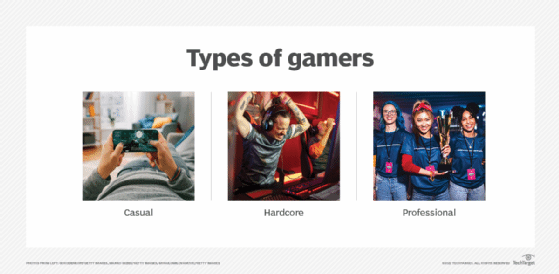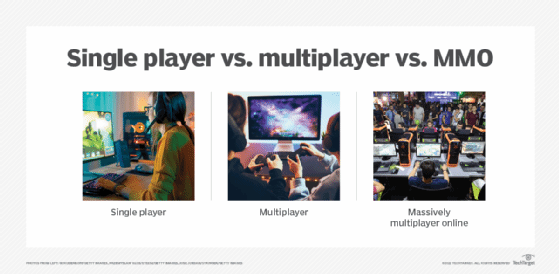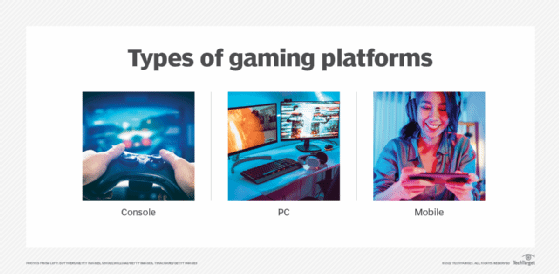gaming
What is gaming?
Gaming is playing an electronic video game, which is often done on a dedicated gaming console, PC or smartphone. People who often play video games are called gamers.
How popular is gaming?
Gaming is an extremely popular activity worldwide. The number of people who play games is estimated to be over 3 billion. Some estimates put the worldwide gaming market value between $180 billion and $220 billion in 2022. This is about double the market for the global film industry. The majority of the gaming market is people playing games on their smartphones.
What are the origins of gaming?
The word gaming originated in the 15th century to refer to gambling in dice or card games. Gaming was used to refer to gambling until the late 1900s, where it was applied to playing recreational board games and pen-and-paper role-playing games. With the introduction of video games in the 1970s, the term gaming became more associated with its current use.
Types of gaming
What are casual, hardcore and professional gaming?
Gamers are often ordered into several groups, depending on how often and how involved they are with gaming.
A casual gamer is someone who irregularly plays games or who only plays a single low-intensity game. An example casual gamer would be someone who plays word or puzzle games on their smartphone while on public transportation or at home while watching TV. Casual gaming is the largest portion of the gaming market due to its wide appeal and the ease of access provided by smartphones. A casual gamer would often not self-identify as a gamer.
A hardcore gamer is someone who regularly plays video games. They usually own dedicated video game devices, such as consoles or gaming PCs. A hardcore gamer often plays many games but focuses on one game or type of game they particularly enjoy. A hardcore gamer usually self-identifies as a gamer.
A professional gamer is someone who makes money or supports themselves by playing games. Some are e-sports athletes who play video games at a professional level in tournaments. They may be part of a team, or clan, and play in broadcasted events. They may make money from tournament prize pools and from corporate sponsorships. They usually focus on only a single game. Another type of professional gamer is a streamer. A streamer makes money by posting video of them playing games. These videos are often done live and put on Twitch or YouTube. They make money from viewer donations, sponsorships and ad revenue.
While these are the traditionally accepted categories of gamers, there is no definitive way to classify all gamers, and these categories are skewed toward traditional gaming culture. For example, a retired woman who plays a farming or Sudoku game on her iPad for many hours a day would be considered by many people a casual gamer, although she probably plays video games for more hours a month than a traditional hardcore gamer.

Single player vs. multiplayer vs. massively multiplayer online gaming
Video games can be played alone or with others. With the internet now widely available, playing games with other people is now extremely popular.
Single-player games are games that are played alone. These types of games traditionally tell a narrative and take the player on an adventure or through a story. They often present a series of challenges that get progressively harder. These are self-contained experiences and are paid for upfront at purchase. Most games have a single-player campaign but may also include a multiplayer component.
Multiplayer games are games that are played with a small group. Typically, they have between two and 100 players at a time. They usually take the form of one person or team against the other in matches. They are designed to be played competitively, and there is no story between the matches. Multiplayer games can be played locally with people in the same room or over the internet. Multiplayer games may be paid for at once in a purchase or be free to play (F2P) and have microtransactions to buy small items to fund the game. Some games have a cooperative mode where two or more players work together to overcome a challenge instead of against each other.
Massively multiplayer online (MMO) games are games where thousands of players inhabit the same game world at one time. These are persistent worlds where players can interact and play together. These games are often paid for in a monthly subscription.

Console vs. PC vs. mobile gaming
Gaming is usually played on three kinds of platforms: a video game console, PC or mobile device. All can be played by people individually or with multiple players locally or over the internet.
A video game console is a dedicated device to play video games. The console is commonly connected to a TV, and the player uses a controller to interact with the game. The major consoles are Microsoft's Xbox, Sony's PlayStation and Nintendo's Switch. Games and accessories do not work between console manufacturers. If a game is only released for one console, it is called an exclusive; if the game is available for more than one, it is called a multiplatform game.
PCs can be used to play video games. Gaming PCs are computers designed to optimize for video game performance. These often use fast processors and powerful graphics processing units. The biggest platform for distributing games on a PC is Valve's Steam client, which is a single program where a player can buy, download and play a game, as well as interact with other players and set up multiplayer games. Other popular game stores on PC are the Epic Games Store and Microsoft Store. With the open nature of the PC platform, games can be bought and installed from many places, with many being distributed for free.
Mobile devices, such as an iPhone or Android phone, can be used for gaming as well. These games are often simpler in nature compared to console and PC gaming and are lower cost or even free, supporting themselves through microtransactions or ad revenue. Despite this, mobile gaming is now the largest sector of the gaming marked by both player count and revenue.

Future gaming trends
Cloud gaming is where the gaming software is not run on a device owned by the player. Instead, the game application is run on a cloud server. The player input is sent to the server, and game video is streamed back to the user. Cloud gaming is becoming popular because, as games become more realistic, they require more powerful and expensive hardware to run. With cloud gaming, the user doesn't need to buy and upgrade the equipment, but instead, they just need a relatively low-power device to run the stream.
Virtual reality (VR) games are where the player puts on a headset to see a stereoscopic, three-dimensional (3D) game. These are fully immersive and enable the player to feel like they inhabit the virtual world. Currently, high-quality VR headsets are expensive and require powerful hardware to run. Additionally, some players feel motion sickness during sessions of VR gaming. The lack of wide user adoption prevents most developers from creating games for VR.
Concepts of a fully realized metaverse would combine VR gaming and MMOs with digital property and collaborative work.
Augmented reality (AR) is where game elements are projected over the real world. This can be done in a stereoscopic headset or on a smartphone camera feed. AR gaming in a headset is still in its infancy with equipment to support it, such as Microsoft's HoloLens, being rare. AR mobile games have reached some level of popularity due to their ease of access and the novelty of combining the real world with game elements.
Gamification is adding game elements to other types of activities. This can take the form of adding user levels and progress markers to encourage users to continue using an application. Adding game elements has been shown to improve user attentiveness and engagement.
F2P games do not charge any money from the player. These games can have large install bases and especially attract children as they don't require money upfront. These games often make money by charging for cosmetic items or by artificially limiting play time and charging for premium content. The game publisher often does not make any money from the vast majority of the players. A few players, however, pay large sums of money -- sometimes, hundreds of dollars -- to get the premium content; these players are called whales in the industry.
What are the benefits of gaming?
Proponents of gaming say that there can be benefits of regular game playing.
Gaming can promote cognitive growth. Games can provide puzzles and challenges that players must figure out and overcome. Some games require that the player multitask and prioritize objectives to find the best outcomes. Players can learn to make good decisions quickly. Some games can simulate real-world science, history and economic systems. Some studies have shown that people who play games are better at tasks requiring short-term memory recall.
Playing games can promote spatial reasoning. Players can learn to form mental maps and navigate in 3D space. This can lead to better navigation in the real world. It has also been shown that surgeons who play video games before performing laparoscopic or robotic surgery have better outcomes than ones who do not.

Some games can teach beneficial lessons to the player. These games can be instructional by design to teach a lesson in history or another school topic; this has been called educational software or edutainment. Other games simply involve real-world topics or scientific principles, where the player learns about those by playing it.
Controversies in gaming
Video games have attracted controversies due to how they are produced, their content and how they are played.
Many games feature violent content, which may lead to the player becoming desensitized to violence. Some have linked playing video games to violent acts and other antisocial behavior.
It is possible to become addicted to gaming. This can lead to players ignoring their personal lives or becoming removed from society. This has led some countries to enact laws limiting how long children can play a game for.
Random rewards are featured in some games. In some cases, these random rewards may be paid for by real money in microtransactions or can be bought and sold on a market. Some equate this to gambling. A few countries have placed laws on the practice of paying for random rewards to protect consumers.
The content of some games has been criticized as being misogynistic in nature. The majority of video games are written, designed and programmed by men, so the female characters can be oversexualized or have not fully realized personalities. Additionally, the women in video game narratives are often portrayed as being helpless or as objects to be rescued or collected.
Some have criticized the workplace culture of many video game studios as being toxic to workers. Since many games are made to a release date, this can result in pressuring the employees to regularly work overtime to meet a deadline. This has been called crunch culture.
See also: motion-controlled gaming, live action role-playing, in-app purchase, in real life, first-person view and overclocking.
